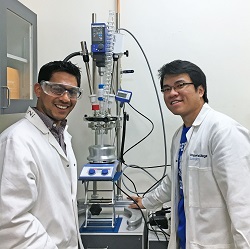Research into the fluid dynamics of fine particulate materials at the department of chemical engineering at Imperial College London is set to benefit from a customised laboratory reactor system from Asynt.

Imperial researchers with the Asynt reactor system
With a bespoke glass reactor vessel, ReactoMate Datum support stand, and low-profile DrySyn heating block, the setup was supplied and installed by Cambridgeshire-based Asynt.
The department is a world-leading institution in chemical engineering research and education.
The Matar fluid group, led by Professor Omar Matar, focuses on interfacial fluid mechanics with an emphasis on modelling, simulation and experimental data collection.
A key requirement for the system was the ability to track and image particles within the reacting fluids.
This meant that a conventional oil heating jacket to could not be used, due to the optical distortion created by the oil layer.
Asynt developed a heating system using a special reactor vessel and custom low-profile aluminium heating block, designed to maintain visibility into the vessel during the reaction.
The use of a hotplate stirrer mounted on an Asynt lab-jack enables quick removal of the heating source.
Also included was a custom glass lid with ports to accommodate a PTFE stirring shaft, a thermocouple for accurate temperature control, aCondenSyn waterless condenser, and probes for data capture.
Ryan Lee, a researcher in the group, noted that a key requirement was that the system installed to a strict deadline: “Not only did Asynt have the skills to create and deliver our custom reactor system on time, but also provided excellent technical support throughout”.
